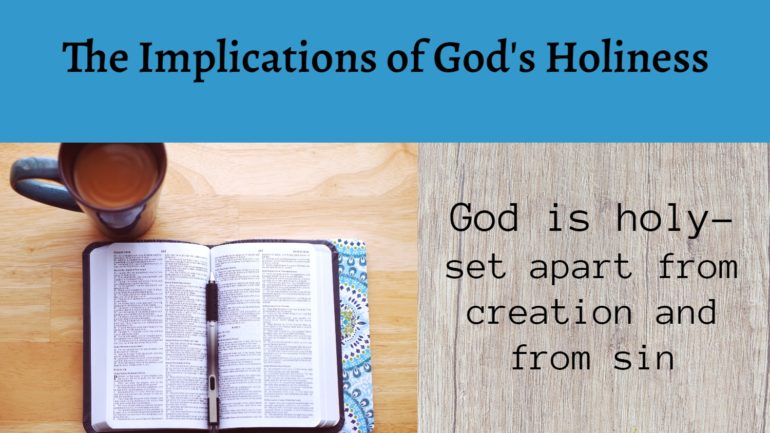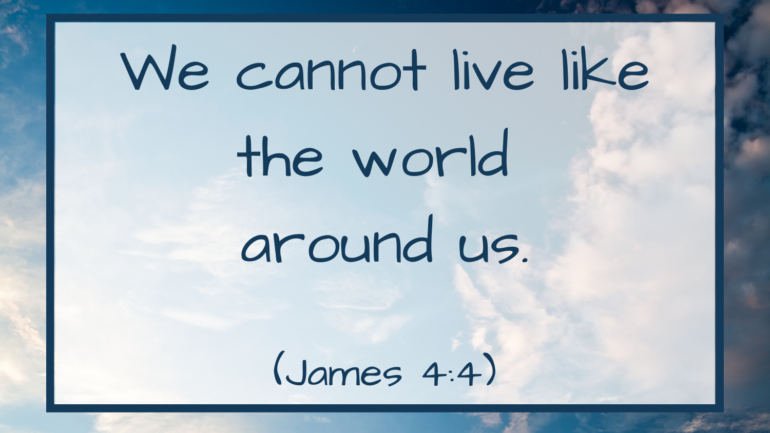To study God’s attributes, the best place to start is with God’s holiness. This is the most common attribute connected to God, and it’s often repeated for emphasis, usually to the third degree. For instance, in Isaiah 6:3, the seraphim are calling out, “Holy, holy, holy is the LORD of hosts.” In Revelation 4:8, the creatures surrounding God’s throne are also proclaiming, “Holy, holy, holy is the Lord God Almighty.” They are actually saying, “Holy, holier, holiest is the Lord God.” This is the only attribute proclaimed around God’s throne day and night, so I would say that it’s important understand God’s holiness.
What is holiness?
Holiness is one of those Bible words that can be hard to define. There are actually two meanings that we need to look at in regards to God’s holiness. God’s attributes can be divided into two categories, His communicable attributes (those we share) and incommunicable attributes (those unique to God alone). Holiness can actually fall into both of those categories, depending on which aspect you’re talking about. Both refer to God’s separation, but He is set apart in two ways.
God’s Majestic Holiness
First, God is set apart in His awesome majesty. There is nothing and no one like Him. This is what we call God’s majestic holiness. God is transcendent, meaning He is above and outside of His creation as the only Uncreated One. He is in a class by Himself. God is totally different than us, totally unique, unlike anything we’ve ever experienced. We often treat Him as if He’s like us only magnified a million times, but He’s not just some super-glorified type of human. He is infinitely greater and completely other than anything in His creation. This aspect of His holiness obviously is incommunicable. We are human and can never be transcendent like God.
In Exodus 15:11, Moses describes God’s majestic holiness when he sings, “Who is like you, O LORD, among the gods? Who is like you, majestic in holiness, awesome in glorious deeds, doing wonders?” The implied answer to Moses’s questions is “No one!” In 2 Samuel 2:2, Hannah prays, “There is none holy like the LORD; there is none besides you.”
God’s Moral Holiness
Second, God is set apart in His perfect morality, which we call His moral holiness. He is separate from sin, and from all that is not perfect. He is pure and completely untainted by the corruption of this world. This means that He cannot be tempted to sin. God has no conscience, because He can’t think or do anything that is evil.
God also cannot approve or tolerate sin. This means that He’s not just separate from sin, He’s separate from anyone who commits sin. According to Jerry Bridges, “Because God is holy, He can never excuse or overlook any sin we commit, however small it may be.” Habakkuk (1:13) refers to God as “You who are of purer eyes than to see evil and cannot look at wrong.”
David is even more explicit:
For you are not a God who delights in wickedness; evil may not dwell with you. The boastful shall not stand before you eyes; you hate all evildoers. You destroy those who speak lies; the LORD abhors the bloodthirsty and deceitful man.
Psalm 5:4-6
God’s Holiness Revealed
In Exodus 19, we see both God’s majestic holiness and moral holiness illustrated when God appears to the Israelites at Mt. Sinai.
God’s moral holiness is seen in the need for the people to purify themselves in verses 5-15. Because God is pure and cannot be in the presence of sin, the people were expected to obey God’s commands and to be morally pure in order to be God’s people. They were also to purify themselves before coming into His presence. In verses 16-20, God’s majestic holiness is revealed. There was thunder and lightning. A trumpet sounded and a cloud covered the mountain. The people trembled in the presence of God, and were unable to approach the mountain. They were being reminded of how majestic and transcendent God is. He is not like them, and must be treated with the utmost reverence and awe.
Implications of God’s Holiness
Unlike God’s majestic holiness, God’s moral holiness is communicable.
We are commanded in Scripture to be holy as He is holy (1 Peter 1:16). We are to strive for moral perfection, seeking to rid ourselves of every bit of sin in our lives. Too often, we try to make excuses or justify our sin. We justify our critical speech by saying that we’re just outspoken. Instead of dealing with our anger issue by saying, “My kids just make me so mad,” or “Bad tempers just run my family.” We may even refuse to identify our behavior as sin at all, claiming that we just have some bad habits.
We also deceive ourselves into thinking that we’re not that bad, usually by comparing ourselves to worse sinners than we are. Joel James, the author of Taste and See that the Lord Is Good, writes…
I can imagine myself to be holy so long as I strictly confine my gaze to other sinners (and only if I gaze at the worst of them). But the moment I raise my eyes to contemplate the God of Scripture, the house of cards I call my holiness collapses.
We must realize that our standard of holiness is God Himself. When we compare ourselves to His purity and perfection, we can’t help but realize the true extent of our sinful nature. When gazing on His holiness, we will no longer seek to justify or make excuses for our sinful behavior. Instead, we will be convicted of and mourn even the smallest of our sins.
That may sound depressing, because we know that, although we strive for perfection, we can never achieve it. As hard as we try to rid ourselves of sin, we just can’t seem to do it. That leads us to our second implication of God’s holiness.
Our standing before God is based on the holiness of Christ alone.
When we were saved, Christ took our sin upon Himself, and He gave us His righteousness. God cannot look upon sin, so God cannot look upon those who do not have Christ. Without Christ, they cannot come into His presence. When He looks believers, though, God doesn’t see our sin. He sees the holiness and obedience and sinlessness of Jesus. That’s why, even though we are sinful, we can still enter into the presence of the holy God.
This does not mean that we can continue to sin. We should try to stop sinning, but we do not do this in order to earn our salvation, or earn God’s favor. He doesn’t love us more when we do not sin, and He doesn’t love us less if we do sin. His love is unconditional, not based on what we do or don’t do.
Our desire to obey and to stop sinning is because of our love for God. Just as a child obeys her parents because she wants to please them, in the same way we should want to obey God in order to please Him. Jesus Himself says that if we love Him, we will obey Him (John 14:15).
The information in this post was based on the following resources:
Behold Your God: Rethinking God Biblically by John Snyder
In His Image: 10 Ways God Calls Us to Reflect His Character by Jen Wilkin
The Attributes of God DVD by Steven Lawson
Taste and See that the Lord Is Good: A Study of the Attributes of God by Joel James
An excellent resource to learn more about God’s holiness is a book by R.C. Sproul, entitled The Holiness of God.
Unless otherwise noted, Scripture quotations are from The ESV® Bible (The Holy Bible, English Standard Version®), copyright © 2001 by Crossway, a publishing ministry of Good News Publishers. Used by permission. All rights reserved.






Seeking God's Face: Discovering the God of the Bible - She Lives Worthy %
[…] The Implications of God’s Holiness (blog post) […]
ASC
Amen. Thank you.
Lydia
Thanks for reading my post!